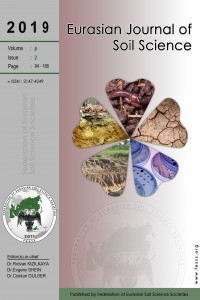
Eurasian Journal of Soil Science
Yazarlar: Zsolt KOTROCZÓ, Zsuzsa VERES, Borbála BİRÓ, János Attila TÓTH, İstván FEKETE
Konular:-
DOI:10.18393/ejss.87903
Anahtar Kelimeler:Added litter,Removed litter,Carbon-cycle,CO2 efflux,DIRT
Özet: The increasing temperature enhances soil respiration differently depend on different conditions (soil moisture, soil organic matter, the activity of soil microbes). It is an essential factor to predicting the effect of climate change on soil respiration. In a temperate deciduous forest (North-Hungary) we added or removal aboveground and belowground litter to determine total soil respiration. We investigated the relationship between total soil CO2 efflux, soil moisture and soil temperature. Soil CO2 efflux was measured at each plot using chamber based soil respiration measurements. We determined the temperature sensitivity of soil respiration. The effect of doubled litter was less than the effect of removal. We found that temperature was more influential in the control of soil respiration than soil moisture in litter removal treatments, particularly in the wetter root exclusion treatments (NR and NI) (R2: 0.49-0.61). Soil moisture (R2: 0.18-0.24) and temperature (R2: 0.18-0.20) influenced soil respiration similarly in treatments, where soil was drier (Control, Double Litter, Double Wood). A significantly greater increase in temperature induced higher soil respiration were significantly higher (2-2.5-fold) in root exclusion treatments, where soil was wetter throughout the year, than in control and litter addition treatments. The highest bacterial and fungal count was at the DL treatment but the differences is not significant compared to the Control. The bacterial number at the No Litter, No Root, No Input treatment was significantly lower at the Control. Similar phenomenon can be observed at the fungal too, but the differences are not significant. The results of soil respiration suggest that the soil aridity can reduce soil respiration increases with the temperature increase. Soil bacterial and fungal count results show the higher organic matter content and soil surface cover litter favors the activity.